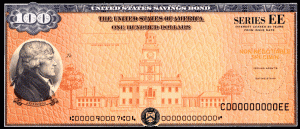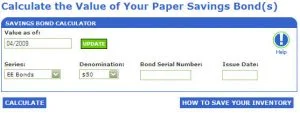
If you are like me, you have a big stack of US savings bonds that has been accumulating dust in a safe deposit box since you were born. If you are under 30, those are still gaining interest today. But what should we do with our savings bonds? I never thought to cash mine in until I got to grad school, and that prompted quite a bit of research into how to deal with finding the value, paying the taxes, and cashing in my bonds. I will take you through the process I went through up to today, the day I take my bonds to the bank.
The first thing to do if you have savings bonds, if you want to cash them or not, is to find the value. The best place to go for that is treasurydirect.gov. Treasury Direct is the US Treasury website for bonds and similar instruments. The bond calculator requires you to enter the issue date and face value of the bond to find the current value. You can enter all of your bonds into the calculator to find the current value of all bonds and interest earned.

If you decide you want to cash the bonds, you should look into tax deduction options. Using your bonds for qualified higher education expenses (such as tuition and fees) or if you modified adjusted gross income is below $82,100 (or double that if filing jointly with another individual. Everyone’s situation is a little different, so consult with a tax professional for personalized information.
If you do not cash the bonds, you can convert them to “electronic savings bonds”. Treasury Direct has a simple process for doing this. A word of caution, if your bonds are matured and you convert them to electronic bonds, they will be cashed out automatically. If you want to keep a matured bond, you have to keep it in paper. To convert the bond, you have to sign up for an account at Treasury Direct and set up a conversion account. You list each bond individually that you plan to convert, and you mail the bonds to the US Treasury. The bonds will then show on your Treasury Direct account. From there, you have the option to cash the bonds in and transfer the funds to your bank account as an ACH or leave them to accumulate interest. Another perk of Treasury Direct is the ability to purchase and manage all of your savings bonds in one place.
I took the other route to cash my bonds, I went to the bank. Any bank or credit union in the United States should be able to cash in your bonds. I took 18 in this morning to convert and spent an hour dealing with the paperwork and whatnot. If you bring the bonds to the bank, be sure to bring a valid drivers license or other government issued ID with you for verification. The process is fairly simple, but it does take a while for the bank teller to fill everything out.
You can cash your savings bonds 5 years from the issue date without any penalty. They will generally reach the face value in 10-15 years, but you can hold on to them to continue accuring interest for up to 30 years for all series E, EE, or I bonds (the most common for individuals). You must pay taxes on interest earned during the entire period unless you fall into the categories outlined above.
One last issue I want to touch on: savings bonds are not just for kids. While savings bonds are popular presents for newborns and Bar Mitzvahs, you can buy them for yourself at any time in your life. Many employers, and Treasury Direct, offer automatic savings bond purchase plans.
While working in banking, I had a customer come in every two weeks with a $500 savings bond that she and her husband had bought 30 years earlier. Though she was long retired, she had a steady $1000 per month come in from an investment she made during her working years. This is a great option for no risk investments. The only downside is that with low risk comes low interest. Current bond rates are only 1.3% and are fixed for the lifetime of the bond. New rates are set every 6 months. If you get a good rate, however, you get it for the life of the bond as well. The bonds I just cashed earned about 4% for the last 24 years.
I hope this post tells you everything you ever wanted to know about US Government Savings Bonds. If not, please let me know in the comments. I promise that I will find an answer to your questions and post them back here.
